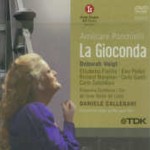Regardless of almost anything else, the success or failure of any performance of La Gioconda depends on the soprano singing the title role. The voice must be big and full of colors, equally strong across a two octave-plus range reaching high-C, and capable of singing at all dynamic ranges. And the soprano must have stamina: the final act is about 35 minutes long, and Gioconda sings almost constantly, at the end of a very long, arduous evening. The fact that the libretto is one of the worst in all of opera matters little if the lead soprano has convinced us of her utter misery, love, devotion, and despair.
This performance, taped live at Barcelona’s Teatre Liceu in 2005, stars Deborah Voigt, and much to my surprise she is marvelous in the role. She doesn’t come near the searing intensity of Callas (on CD) or Scotto (in the opera house in the ’70s, although her voice was too small for the part), but nonetheless I have never heard her sing with such commitment, so much voice, and such “guts”, and she makes the role her own. Her pianissimos are lovely, she rides over the orchestra with ease, and though visibly tired in the final act (she ducks a high note at the close of the trio with Laura and Enzo), she still pulls out all the stops, including some startling and startlingly effective chest voice. Do we believe she is a Venetian street singer? Hardly –but she’s one mighty good opera singer, and to my ears she has never sounded better.
Richard Margison is the somewhat stiff Enzo, far from a true Italian tenor, but his big, reliable voice is most welcome, and since the role is entirely lacking in subtleties, there’s little to complain about. Contralto Ewa Podles sings La Cieca, Gioconda’s blind, helpless, pious mother, and she’s stunning. She’s a great melodramatic actress, and her gigantic voice, while never suggesting frailty, is a glory to hear. Carlo Guelfi sneers and snarls as Barnaba, using his grand baritone with Machiavellian nastiness. Mezzo Elisabetta Fiorillo sings Laura with unappealing tone and gracelessness, both vocal and physical, and Carlo Colombara is a properly cold Alvise, his sound big and scary as he condemns her to death.
Director and set/costume designer Pier Luigi Pizzi has not exactly opted for minimalism, but he certainly has sobered up Venice, making no visual references to San Marco or other grand buildings. There are bridges that imply canals and gondolas; Enzo’s ship in the second act, with its huge blood-red sails is very effective. For the third-act party/dance scene, Laura is lying stage front on a bier, and nobody notices. This is in keeping with the endless and pointless Carnival atmosphere of the piece: it’s in the opera and Pizzi underlines it. Everyone is having inane fun, dancing and celebrating, while the very personal tragedy of Gioconda and her mother is going on around them. This is an unfriendly Venice. Somehow, it works well: the plot is melodramatic enough without the sets competing with it.
The conducting of Daniele Callegari gets better as the opera continues. It’s far too leisurely for the first two acts, but it gains in fire later. The nearly nude choreography for the Dance of the Hours by Gheorghe Iancu is terrific, and the soloists are first rate. The 16.9 picture and three choices of sound reproduction are excellent, and there are subtitles in the languages you’d expect plus Catalan. This entirely pushes the old Eva Marton/Domingo video out of the running–it’s a grand-scaled performance of this big, overstated opera.
































